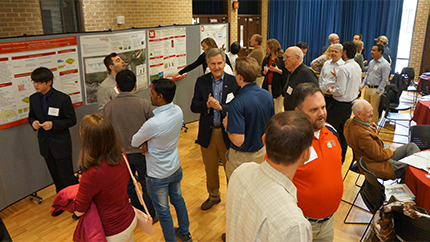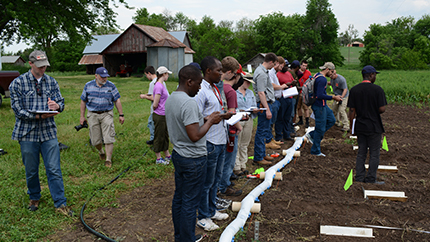DWFI sees education, in both formal and informal settings, as advancing knowledge for now and the future. In keeping with the institute’s mission, there is a concerted effort to build future leaders in water and food security by educating the next generation and engaging young talent.
DWFI’s educational strategy includes a variety of delivery formats to best meet the needs of participants, including academic teaching, extension, web-based education delivery, seminars and workshops, field studies, special events and community outreach.
On-Demand Workshops
Through our extensive network of staff, Faculty Fellows, and collaborators, DWFI has the capacity to organize workshops upon request. The date, location, and duration of these workshops is established based on stakeholder needs. A range of educational opportunities is identified below, representing a variety of research targeted towards our five focus areas. These training programs may be taken individually or in combination.
This list is intended to start a planning discussion between the interested parties and DWFI leadership. The earlier we begin planning, the more comprehensive and organized the workshop will be. Costs range from $500 to $1,500 depending on the number of people participating and the length of the workshop. Travel and food is not provided. However, we strive to make these workshops accessible to all — please contact us at waterforfood@nebraska.edu if you would like to inquire about funding opportunities.
Water Productivity and Yield Gap Analysis
Focus Areas:
FA1 - Closing Water and Agricultural Productivity Gaps
- Utilize the Yield Gap and Water Productivity Atlas to identify areas with the greatest potential for crop intensification and assess national food self-sufficiency and scenarios of crop production and land use.
- Learn methodologies from the University of Nebraska to calculate water productivity for multiple crop and livestock products that may be applied globally.
- Identify reasonable water productivity goals based on specific soil and climatic areas.
Regional Evapo-Transpiration and Water Balance Assessments
Focus Areas:
FA1 - Closing Water and Agricultural Productivity Gaps
FA2 - Improving Groundwater Management for Agricultural Production
FA5 - Managing Agricultural Drought
- Learn to use the GloDET data portal and the PyDisALEXI software to calculate daily evapo-transpiration (ET) at 30-meter resolution.
- Then, learn how to use ET data to determine plant water stress (a drought indicator), field scale water productivity and crop yield estimates, and water availability in watersheds and river basins.
Drought Vulnerability Assessment Training & Regional Drought Management Systems
Focus Areas:
FA2 - Improving Groundwater Management for Agricultural Production
FA5 - Managing Agricultural Drought
- Empower decision-makers to plan for and manage the impacts of droughts on food and water security under current and future climate conditions.
- Use the GloDET data portal to assess drought risk.
- Learn best techniques for conducting needs and opportunity analysis, implementing a drought monitoring system, and conducting vulnerability and impact assessments.
- Experts from DWFI and the National Drought Mitigation Center (NDMC) will facilitate stakeholder involvement and planning process.
Nebraska Groundwater Management Tour
Focus Areas:
FA2 - Improving Groundwater Management for Agricultural Production
- Learn the Nebraska model of effective groundwater governance at the local level through Natural Resources Districts.
- See how state and local governments interact to regulate hydrologically-connected surface and groundwater.
- Identify best management practices for monitoring, modeling, and regulating groundwater.
- Understand factors influencing farmers’ decisions regarding how to use groundwater, and how to promote entrepreneurship and innovation.
From Land Surface to the Aquifer: Vadose Zone and Recharge Monitoring
Focus Areas:
FA2 - Improving Groundwater Management for Agricultural Production
FA4 - Supporting Freshwater and Agriculture Ecosystems and Public Health
- Gain insight into the physical and chemical properties of the vadose zone – the unsaturated area between the land surface and groundwater table – through the Nebraska Vadose Zone Database.
- Understand how contaminants are transported within the vadose zone and affect groundwater supply. Learn best management and monitoring practices.
Crop Modeling for Nutrient, Irrigation, and Yield Management
Focus Areas:
FA1 - Closing Water and Agricultural Productivity Gaps
FA3 - Enhancing High-productivity Irrigated Agriculture
- Learn proprietary crop modeling software, such as the Hybrid-Maize model, from the developer, DWFI Faculty Fellow Haishun Yang.
- Simulate crop growth and yield based on resource input, such as water and fertilizer.
- Schedule irrigation and fertilizer applications based on optimizing target yields and costs.
Smart Water Meters for Water and Energy Efficiency
Focus Areas:
FA2 - Improving Groundwater Management for Agricultural Production
- Explore reasons for high variability in energy efficiency at a well level by implementing smart water and energy meters.
- Better understand the cost and efficiency of groundwater pumping and how individual producer costs compare to an anonymized peer group.
- Target opportunities for energy and water conservation improvements, as well as improve peak load management and energy policy design.
Variable Rate Irrigation Operation and Training
Focus Areas:
FA1 - Closing Water and Agricultural Productivity Gaps
FA2 - Improving Groundwater Management for Agricultural Production
FA3 - Enhancing High-productivity Irrigated Agriculture
- Utilize the latest technology, including software and hardware, to create variable rate irrigation prescription maps to conserve water from center pivot irrigation while maintaining high yields.
- Incorporate satellite-based remote sensing of ET, imagery from unmanned aerial vehicle (UAV) flights, and ArcGIS software into a field experience.
Support for Smallholder Irrigated Agriculture in Developing Countries - Learn strategies from University of Nebraska irrigation experts to identify and support viable business models, improve agricultural production systems and water
- Identify the best lifting devices (pumps), irrigation schemes, and water application technologies for your case, and progress through the implementation steps, such as these steps for shared center pivot irrigation.
AquaCrop-OS Training
Focus Areas:
FA1 - Closing Water and Agricultural Productivity Gaps
FA2 - Improving Groundwater Management for Agricultural Production
FA3 - Enhancing High-productivity Irrigated Agriculture
- Receive hands-on training from the developers of AquaCrop-OS, a free, open-source version of AquaCrop, a crop water productivity model.
- AquaCrop simulates yield response to water for multiple crop types and environmental conditions and is designed specifically for regions where water is a critical limiting factor in crop production.
- AquaCrop is intended for use by both scientists and practitioners, and requires minimal data inputs in comparison with most other crop models.
- Learn practical strategies to implement water markets, including transaction costs; mechanisms to build trust; monitoring; verification; governance requirements; and level of formality.
- Understand how to incorporate realistic hydrologic or biophysical processes and benefit from real world case studies.
Water Re-Use in Food Processing
Focus Areas:
FA4 - Supporting Freshwater and Agriculture Ecosystems and Public Health
- Receive expert analysis and training to identify points within the crop, dairy, or livestock processing system where water reuse is possible, regardless of your level of technology.
- Water quality is considered, and tests are taught as needed, to ensure water reuse is sanitary and safe.
Floating Wetland Treatment
Focus Areas:
FA4 - Supporting Freshwater and Agriculture Ecosystems and Public Health
- Tour the East Campus MesoLab, under the direction of DWFI Faculty Fellow Tiffany Messer, to learn best management practices to treat non-point source pollution in surface water.
Customized Workshops
Beyond the opportunities described above, DWFI is able to customize workshops based on your unique needs. We can create tours and workshops specifically for you, within the entire range of topics and expertise of our institute’s staff, Faculty Fellows, Global Fellows, and partner organizations. Trainings may be held in Nebraska, the United States, or in the home country of the workshop participants.
For more information, contact Lacey Bodnar, Research Project Manager, lbodnar@nebraska.edu.
Scholarships and Student Support

Scholarships and internships provided by DWFI and its partners support undergraduate, graduate and doctoral students both domestic and international, paving the way for the next generation of water for food leaders.
Recurring Events & Opportunities

DWFI’s signature event is the Water for Food Global Conference, attracting respected experts; governmental and non-governmental organizations; academic researchers and students; farmers and farm suppliers; donors; and private industry leaders from many countries around the world. Other events and classes include the Water for Food Global SEEDS learning community; Field Irrigation Course; International Student Scholar Course; IHE-Delft Double Degree Program; and the Nebraska Water Center’s Fall Symposium, Spring Seminar Series and Water and Natural Resources Tour.

